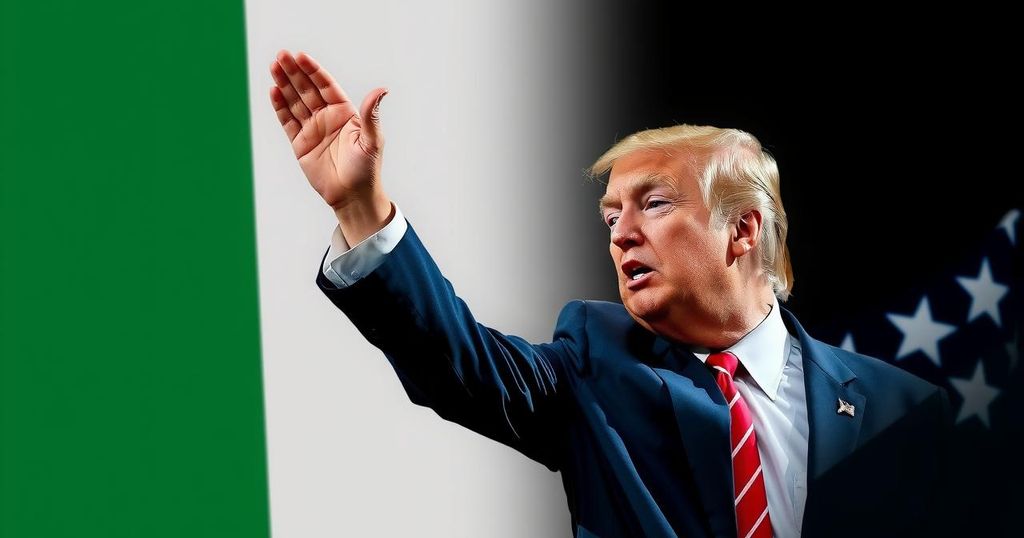Implications of Donald Trump’s Re-election for Nigeria and Africa
Donald Trump has won a second presidential term, predicting a transformative era for America. His “America First” policy may lead to diminished focus on Africa, compelling Nigerian leaders and citizens to brace for tougher immigration policies, economic tariffs, and potential neglect of key issues such as trade and security. The re-election could significantly influence existing U.S.-Africa relations.
Donald Trump has secured a historic second term as President of the United States after defeating Democratic candidate Kamala Harris. In his victory speech, he proclaimed that the American public has granted him an unprecedented mandate, which he believes will usher in a golden age for the nation. His return to the White House is expected to significantly alter U.S. foreign policy, as Trump has committed to pursuing non-interventionism and prioritizing domestic over international concerns under his “America First” policy. This approach raises questions about how it will affect relations with Nigeria and Africa overall. Analysts suggest that Trump’s focus on “America First” could mean that African nations must increasingly fend for themselves regarding financial support and security. Though U.S. presidential candidates tend to overlook Africa during their campaigns, the implications of Trump’s policies are of particular concern to many Africans. Following his electoral success, leaders from across the continent, including Nigeria’s President Bola Tinubu, congratulated Trump, expressing hopes for stronger ties between the U.S. and Nigeria amid global challenges. Historically, Trump’s first term demonstrated limited engagement with Africa, marked by an absence of visits to the continent and controversial comments regarding its nations. As he gears up for a second term, there is hope among analysts that this will lead to a renewed focus on essential issues such as health, trade, and security in Africa. Under a Trump administration, Nigeria should expect stringent immigration policies akin to those enacted during his first term, emphasizing the deportation of undocumented immigrants. This is reflected in Trump’s previous statements regarding prioritizing American interests and the perceived need for African nations to develop independently. On economic matters, experts express concern that Trump’s victory could adversely affect developing nations like Nigeria. With the U.S. aiming to bolster its own industries, the prospects for trade and economic cooperation may diminish. Furthermore, Trump’s agenda includes significant tariffs on imported goods, which could complicate Nigerian exports and economic growth. Finally, while Trump has not focused heavily on LGBTQ+ issues during his campaign, his past positions indicate a strict stance against same-sex marriage and related rights. This position aligns with Nigeria’s existing cultural and legal framework regarding LGBTQ+ matters, indicating that little progress may be made under Trump’s leadership. Overall, the intersection of Trump’s policies with Nigeria’s future remains a pivotal concern as his administration unfolds.
The article discusses the implications of Donald Trump’s re-election as President of the United States and how his policies, particularly the “America First” strategy, might impact Nigeria and Africa. Given Trump’s historical stance on foreign relations, especially regarding immigration and trade, the piece explores the potential ramifications for African countries that have been seeking closer ties with the U.S. It highlights the reactions from Nigerian leaders and the broader context of U.S.-Africa relations under the Trump administration.
In conclusion, Donald Trump’s victory could lead to significant shifts in U.S. policy that may disadvantage Nigeria and other African nations. Trump’s focus on domestic over international concerns, coupled with stringent immigration and economic policies, raises alarms about the future of U.S.-Africa relations. Moreover, his past positions on social issues reinforce the challenges that Nigerian leaders will face in fostering a mutually beneficial partnership with the United States.
Original Source: www.bbc.com




Post Comment